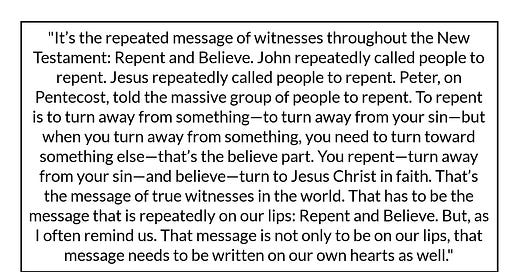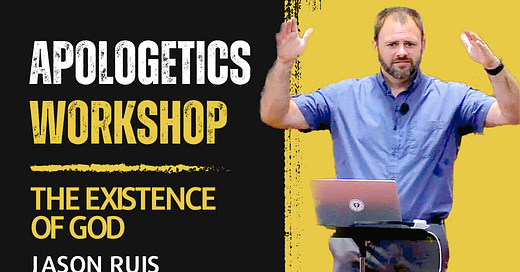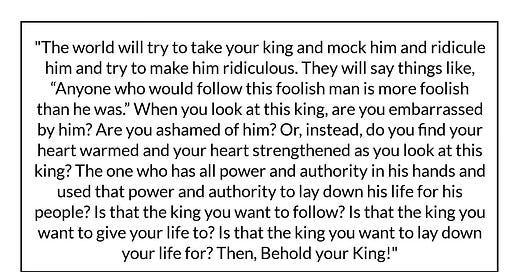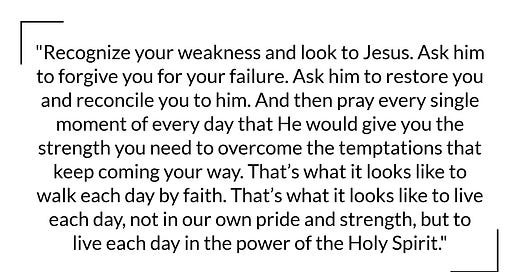
The Forerunner
[Read John 1:19-28]
There are many dangers to being a witness in the world. We’ve already looked at passages that have taught us that “The light shines in the darkness, and the darkness has not overcome/understood it.” (John 1:5, ESV). So, we’ve already seen this danger of our own witness in the world. As our light shines in the darkness of this world, that light will often be misunderstood—our witness will often be misunderstood. And often, along with that misunderstanding comes mistreatment.
I’ve been thinking of some interactions I’ve had lately with a few people. It’s nobody you would know, but I’m going to be very vague anyway. As I’ve spoken with these people—witnessed to them—it has been very difficult. It hasn’t mattered what I said or how I said it, they didn’t understand me. At times, it has even felt like these people were working harder at misunderstanding me than understanding me. Then, the more they misunderstand me, the more they mistreat me through false accusations and, sometimes, even slander. They accuse me of saying things I’ve never said. They tell other people that I’ve said things I’ve never said.
Now, I’m not talking about this because I’m trying to defend myself, or anything like that. The reason I’m talking about this is so that we can see how connected misunderstanding and mistreatment are. They often walk hand in hand and together they are one of the dangers that come with being a witness in the world.
However, there’s another danger that comes from being a witness in the world. It’s one we don’t often talk about as dangerous. It’s actually something we all long for a little bit. The danger is not being misunderstood and mistreated, the danger is being exalted and lifted up on a pedestal. The danger is that people will treat you like you’re the best of the best. And the greater danger that flows from this treatment is that we will begin to agree with those people and begin to think of ourselves as the best of the best.
This is also a real danger. We’ve watched it over and over and over again over the past decade. I’ve watched well-known pastor after well-known pastor fall and fall and fall again. Just this past week I heard about another pastor who was removed from ministry because of inappropriate relationships. The more I’ve looked at these cases and studied them, at the root of every one of these pastors was the issue of pride. Proverbs tells us, “Pride goes before destruction, and a haughty spirit before a fall.” (Proverbs 16:18, ESV).
So even though we often think of misunderstanding and mistreatment as being some of the biggest dangers for our witness in the world, one of the biggest dangers is that we would be exalted and prideful in our witness. And when that happens, we lose our witness because we’re no longer pointing away from ourselves to Christ, but we begin to point to ourselves and say, “Look how great I am!”
And this could have been a real temptation for John the Baptist because he was quickly becoming famous. People were flocking to John the Baptist to hear the things he was saying and see the things he was doing. John the Baptist was causing a ruckus in Israel. He caused enough of a ruckus that the Jewish leaders took notice of what he was doing and sent a delegation of people to examine him and figure out who he was and what he was doing. We read, “And this is the testimony of John, when the Jews sent priests and Levites from Jerusalem to ask him, “Who are you?”” (John 1:19, ESV). Later they ask, “Then why are you baptizing…” (John 1:25, ESV). They’re goal was to figure out who John was and what John was doing, but as this interaction develops, we’ll see that they are asking the wrong questions. Eventually, John gives them the answer to the question they should have been asking,
The first wrong question is: “Who are you?” (John 1:19, ESV).
Here’s how John answered their question, “He confessed, and did not deny, but confessed, “I am not the Christ.”” (John 1:20, ESV). That’s kind of a confusing way to write it, but the point of this sentence is that John answered this question clearly. There was no ambiguity when John emphatically said, “NO. I’m not the Christ.” This assumes the priests and Levites asked John if he was the Christ. This period of time was full of Messianic expectation. People were on the lookout for the Messiah. So, it makes sense that someone like John, who was attracting a lot of attention, had people flocking to him, could possibly be the Messiah. So they ask him. He emphatically shoots them down. No way, Jose!
So they respond, ““What then? Are you Elijah?” He said, “I am not.” “Are you the Prophet?” And he answered, “No.”” (John 1:21, ESV). Two more emphatic NOs from John. The religious leaders noticed something about John. He had to be someone special because so many people were coming to him. There was this understanding that prior to the coming of the Messiah Elijah would come and The Prophet would come. So, if John wasn’t the Messiah, maybe he was one of the precursors to the Messiah? But John shoots them down again. Nope. That’s not who I am, either.
So, they ask, “Who are you? We need to give an answer to those who sent us. What do you say about yourself?” (John 1:22, ESV). And I love John’s answer: “I am the voice of one crying out in the wilderness, ‘Make straight the way of the Lord,’ as the prophet Isaiah said.” (John 1:23, ESV). John accomplishes a couple things in this response. In this response he takes a shot at the religious leaders of his day and explains himself further.
He takes a shot at the religious leaders by describing Israel as a wilderness. Or, in the context of Isaiah, this is describing the exile. So, in a way, John is looking at the religious leaders of his day and telling them, “This is a spiritual wilderness and, even though these people are in the Promised Land, they are spiritual exiles. And all of this has happened under your leadership.”
He also describes his task further. He is not the one leading people out of the wilderness or out of exile. He is just the one sent by God to prepare the way. It’s not about Him. As we read earlier in this chapter, he is not the light, but is pointing people to the light.
Before we move onto the next wrong question, notice the bigger picture of this interaction. The religious leaders come to John asking him, “Who are you?” and John responds to them by saying, “Wrong question. Stop asking who I am. This isn’t about me.”
So, they move onto the next questions. Some of the Pharisees in the group ask, “Then why are you baptizing, if you are neither the Christ, nor Elijah, nor the Prophet?” (John 1:25, ESV). Of course the Pharisees are asking this question, right? They are the ones who are all about following the rules. So, in some ways, they are asking by what authority John is baptizing. Basically asking, “Who gave you authority to do this?”
But there’s more going on here than meets our eye. We’ve become so accustomed to these stories and these practices that we miss certain things, like asking the question, “Why is John the Baptist baptizing?” As we read through the Old Testament, baptism isn’t talked about very much. Most of us miss it. So, why would John the Baptist come baptizing people?
The reason is actually pretty offensive to the religious leaders—especially the Pharisees. There are a few different reasons why people would be baptized, but one of the main reasons people were baptized is when they were becoming a Jew. This wasn’t a normal practice for the average Jewish person. It was for non-Jews who wanted to join the Jewish people. And if they wanted to join the Jewish people, they needed to be cleansed and baptized.
Now, do you see why this was so offensive to the religious leaders? John was baptizing Jewish people, and by doing that he was basically saying to them, “You have fallen so far away—this place is such a desert, such an exile—that you are not really Jews anymore. If you want to be true Jews, you need to repent and be baptized, then you once again be a true Jew. You have fallen so far away from your God, that you need to be washed and cleansed to be part of his people again.” That’s pretty offensive, isn’t it? Especially if you are one of the leaders who is responsible for these people.
So, they’re not very happy with John and they want some answers from him. Who do you think you are? What do you think you are doing? If you’re not one of these historical figures, what right do you have to come here and cause these problems? What right do you have to say that these people are no longer true Jews, that they need to repent and be baptized and cleansed in order to be true Jews?
Here’s John’s answer to these questions, “I baptize with water, but among you stands one you do not know, even he who comes after me, the strap of whose sandal I am not worthy to untie.” (John 1:26–27, ESV). Does he answer their question? Not really. At first, I thought he was dodging their question because he didn’t want to answer it, but John is doing something different here. He’s not dodging their question, he’s pointing out that they are asking the wrong question and then answering the question they should have been asking. In effect John is saying, “You guys are so worried about who I am and what I’m doing that you’re missing the entire point. Yeah, I’m baptizing people, but do you know WHO sent me to baptize these people and WHY I’m baptizing them? I’m nothing. Stop looking at me and what I’m doing and start looking at the one I’m pointing to. He’s standing in your midst and you don’t even know who he is. He’s so much greater than me that I’m not even worthy to be his slave, but you still don’t know him because you’re so focused on me.” Once again, John is firing some shots at the religious leaders.
In some ways, John is once again pointing out the fact that they are asking the wrong question. When he told them that his job was to prepare the way for the Lord, they should have immediately responded, “Show us the Lord! We want to see him! How can we be prepared for him?” Instead, they kept their eyes on John, but John does everything he can to keep pointing them away from himself to the one they should be looking at—to Jesus Christ.
This is what it looks like to be a witness. That’s why this passage begins by saying, “And this is the testimony of John…” (John 1:19, ESV). Guess how testimony could also be translated? Witness. This entire story begins by basically saying, “This is the way John the Baptist witnessed when he was asked questions by the religious leaders of his day.” They wondered if he was a big deal—if they should exalt him—and John told them to stop looking at him and pointed them to Christ. They misunderstood him and misrepresented him and John responded by pointing away from himself to Christ and he did it over and over and over again.
These same things are going to happen to us as we witness in the world. Often, our witness will be misunderstood by people in the world. How will we respond? We need to respond by clarifying what we’re doing and pointing people to Christ—fully knowing they will most likely work harder to misunderstand us than understand us. Often, our witness will be misrepresented and mistreated in the world. How will we respond? Will we respond by retaliating and misrepresenting and mistreating in return? No. We will respond like a witness, clarifying things and pointing people to Christ.
Or, we will experience the opposite danger, people will think we are the answer to all of their problems. People will think we are the one who will fix them or the one who will meet their deepest needs—the one they’ve been looking for. How will we respond then? How will we respond when people try to exalt us and idolize us and put us on a pedestal? We must fight the temptation to revel in this flattery and respond the same way John the Baptist responded, “I’m nothing. Why are you looking at me? I’m not even worthy to clean the feet of the man I’m telling you about. Why are you so obsessed with me? Stop looking at me and look at Jesus Christ! He’s the one who can answer your problems. I can’t do that. He’s the one who can meet your deepest needs. I can’t do that. Look at Him!” To say all of this another way, we respond by saying, “I am not the light. My job is just to point you to the light. Stop looking at me.”
And as we do that, part of our witness is to be a “voice of one crying out in the wilderness, ‘Make straight the way of the Lord,’” (John 1:23, ESV). This was also John’s witness. He called people to repent and be baptized. That’s how he prepared the way of the Lord. That’s how he made a clear road out of the wilderness—out of exile—for the people of God. He called people to repent and believe.
That’s the repeated message of witnesses throughout the New Testament: Repent and Believe. John repeatedly called people to repent. Jesus repeatedly called people to repent. Peter, on Pentecost, told the massive group of people to repent. To repent is to turn away from something—to turn away from your sin—but when you turn away from something, you need to turn toward something else—that’s the believe part. You repent—turn away from your sin—and believe—turn to Jesus Christ in faith. That’s the message of true witnesses in the world. That has to be the message that is repeatedly on our lips: Repent and Believe.
But, as I often remind us. That message is not only to be on our lips, that message needs to be written on our own hearts as well. We are not just called to preach a message of repentance and faith; we are called to live lives of repentance and faith. That IS the Christian life—the life that is characterized by turning away from sin and grabbing hold of Jesus Christ by faith. We need to have that message written all over our own hearts and our own lives in order to be effective witnesses in the world—otherwise we’ll be hypocrites.
But here’s the beautiful thing that happens when we live a life of repentance and faith: we have a deeper understanding of what that looks like because we’ve experienced it. Then, because we have a deeper understanding of what it looks like to live a life of repentance and faith, we are better able to show others what that life looks like—because we’re actually living it out. We can actually show people what this life looks like. We can actually tell people what it looks like to turn from sin and grab hold of Jesus by faith. And what are we doing when we show and tell and point people to Jesus Christ through our word and deed? We’re witnessing and preparing the way of the Lord in our own hearts and in the lives of those around us.









